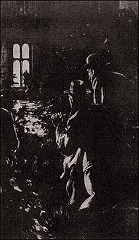Holmes laughed. “Watson insists that I am the dramatist in real life,” said he. “Some touch of the artist wells up within me, and calls insistently for a well staged performance. Surely our profession, Mr. Mac, would be a drab and sordid one if we did not sometimes set the scene so as to glorify our results. The blunt accusation, the brutal tap upon the shoulder - what can one make of such a dénouement? But the quick inference, the subtle trap, the clever forecast of coming events, the triumphant vindication of bold theories - are these not the pride and the justification of our life’s work? At the present moment you thrill with the glamour of the situation and the anticipation of the hunt. Where would be that thrill if I had been as definite as a timetable? I only ask a little patience, Mr. Mac, and all will be clear to you.”
“Well, I hope the pride and justification and the rest of it will come before we all get our death of cold,” said the London detective with comic resignation.
We all had good reason to join in the aspiration; for our vigil was a long and bitter one. Slowly the shadows darkened over the long, sombre face of the old house. A cold, damp reek from the moat chilled us to the bones and set our teeth chattering. There was a single lamp over the gateway and a steady globe of light in the fatal study. Everything else was dark and still.
“How long is this to last?” asked the inspector finally. “And what is it we are watching for?”
“I have no more notion than you how long it is to last,” Holmes answered with some asperity. “If criminals would always schedule their movements like railway trains, it would certainly be more convenient for all of us. As to what it is we- - Well, that’s what we are watching for!”
As he spoke the bright, yellow light in the study was obscured by somebody passing to and fro before it. The laurels among which we lay were immediately opposite the window and not more than a hundred feet from it. Presently it was thrown open with a whining of hinges, and we could dimly see the dark outline of a man’s head and shoulders looking out into the gloom. For some minutes he peered forth in furtive, stealthy fashion, as one who wishes to be assured that he is unobserved. Then he leaned forward, and in the intense silence we were aware of the soft lapping of agitated water. He seemed to be stirring up the moat with something which he held in his hand. Then suddenly he hauled something in as a fisherman lands a fish - some large, round object which obscured the light as it was dragged through the open casement.

“Now!” cried Holmes. “Now!”
We were all upon our feet, staggering after him with our stiffened limbs, while he ran swiftly across the bridge and rang violently at the bell. There was the rasping of bolts from the other side, and the amazed Ames stood in the entrance. Holmes brushed him aside without a word and, followed by all of us, rushed into the room which had been occupied by the man whom we had been watching.
The oil lamp on the table represented the glow which we had seen from outside. It was now in the hand of Cecil Barker, who held it towards us as we entered. Its light shone upon his strong, resolute, clean-shaved face and his menacing eyes.
“What the devil is the meaning of all this?” he cried. “What are you after, anyhow?”
Holmes took a swift glance round, and then pounced upon a sodden bundle tied together with cord which lay where it had been thrust under the writing table.
“This is what we are after, Mr. Barker - this bundle, weighted with a dumb-bell, which you have just raised from the bottom of the moat.”
Barker stared at Holmes with amazement in his face. “How in thunder came you to know anything about it?” he asked.
“Simply that I put it there.”